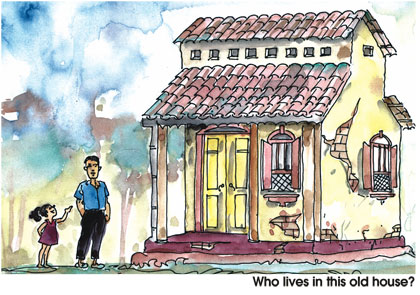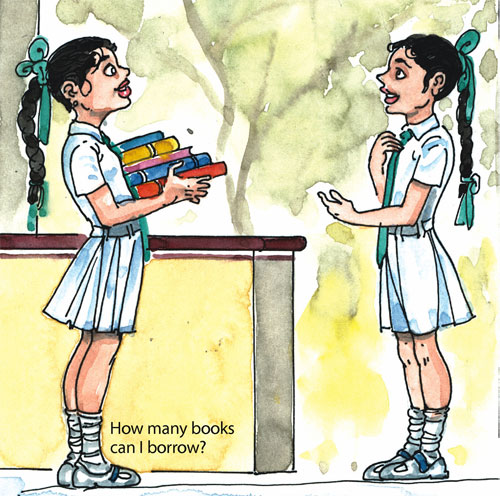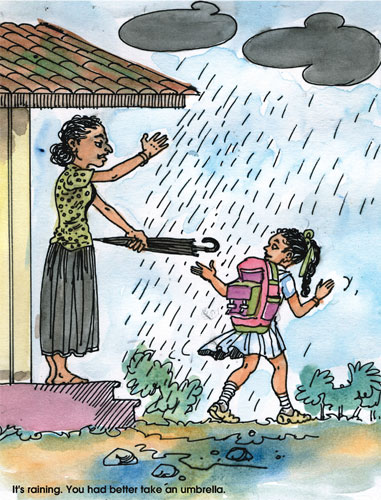|

by R. S. Karunaratne
Question-word subjects
We use ‘who’ for people and ‘what’ for things.
Who
Who did you meet at the exhibition?

Who lives in this old house?
Who plays the violin?
Who taught you English?
Who did she marry?
What
What did you do?
What made you say that?
What does this word mean?
What did you say?
What will happen next?
When ‘who’ or ‘what’ are subjects, we make questions without ‘do / does
/ did.’
Who
Who phoned you?
Who helped him to pass the examination?
Who built this big house?
Who wants so much of money?
Who sleeps in the upstairs?
What
What happened?
What went wrong?
What troubles him?
What irritates you?
What ails the cinema industry?
The same rule applies when subjects begin with ‘which, what, how much’
or ‘how many.’
Which
Which party won the elections?
Which question is difficult?
Which shirt is better?
Which colour goes with this?
Which boy came first?
What
What country won the World Cup in 1966?
What crop is suitable for this season?
What subjects are difficult?
What books are cheap?
What newspapers are delivered to your house?

How much
How much milk can you drink?
How much money is there?
How much bread can you eat?
How much money can they earn?
How much sugar will they buy?
How many
How many friends are coming to the party?
How many books can I borrow?
How many coconut trees are there in your garden?
How many plantains can you eat?
How many buildings can you see from here?
Activity
Underline the correct form and check your answers with the key.
1. Who owns / does own this dog?
2. What happened / did happen to Anarkali?
3. Who plays / does play the drum?
4. Who baked / did bake this cake?
5. Who taught / did teach him English?
6. What means this word? / What does this word mean?
7. What said she? / What did she say?
8. Who told / did tell you my name?
9. Who phoned / did phone Malsha?
10. How many votes he got / did he get?
***************
Key:
1. owns 2. happened 3. plays 4. baked 5. taught 6. What does this
word mean? 7. What did she say? 8. told 9. phoned 10. did he get
***************
Match words and meanings
Here’s a novel way to enrich your vocabulary. Match the words in
column ‘A’ with the meanings in Column ‘B’ and check your answers with
the key. The first has been done for you.
[Column A]
O 1. cerebral
.... 2. cerebrum
.... 3. certainty
.... 4. certifiable
.... 5. certitude
.... 6. cessation
.... 7. chaff
.... 8. chagrin
.... 9. chalet
.... 10. chamber
.... 11. channel
.... 12. chant
.... 13. chaos
.... 14. charade
.... 15. charioteer
.... 16. charming
.... 17. charred
.... 18. chasm
.... 19. chastise
.... 20. chateau
.... 21. chattel
.... 22. chatter
.... 23. chatterbox
.... 24. chatty
.... 25. cheapen
[Column B]
A. one who talks a lot
B. to reduce the price
C. liking to talk a lot
D. a personal possession
E. a large house or castle in France
F. a very deep narrow opening in rock
G. burnt and black
H. somebody who drives a chariot
I. a state of total confusion
J. a television station
K. a small wooden house in mountain areas
L. the outer layer separated from grains
M. the state of being certain
N. something which cannot be doubted
O. relating to the brain
P. to talk about unimportant things
Q. to criticise somebody severely
R. pleasant and attractive
S. an act or event which is clearly false
T. repeat a word or phrase continuously
U. a room used for a special purpose
V. disappointment
W. ending or stopping
X. mentally ill
Y. the front of the brain
****************
Key:
2. Y 3. N 4. X 5. M 6. W 7. L 8. V 9. K 10. U 11. J 12. T 13. I 14. S
15. H 16. R 17. G 18. F 19. Q 20. E 21. D 22. P 23. A 24. C 25. B
****************
Starters:
Use of ‘should’ and ‘ought to’
We use ‘should’ and ‘ought to’ to say what is the best or right thing
to do. There is hardly any difference between the two.
If you are not feeling well, you should consult a doctor.

He helped me to find a job and I ought to thank him.
You should give up smoking.
The police should inform the reason before arresting a person.
Children should do their homework diligently.
Negatives
To make the negative, we use ‘should not’ (shouldn't) or ‘ought not’
(oughtn't).
Politicians shouldn't break their promises.
Students ought not to insult their teachers.
You shouldn't spit in public places.
People ought not to throw garbage on to roads.
Bus conductors shouldn't abuse commuters.
We use ‘should’ and ‘ought to’ in questions.
Who should I consult about my ailment?
This is a difficult problem. How ought I to deal with it?
Should I bring my National Identity Card?
Should I do some more exercises?
How ought we to learn English in a short time?
We can use the continuous form after ‘should’ or ‘ought to.’
It's 10 p.m. She should be watching television.
It's 8.30 a.m. Father ought to be working in his office.
Now the time in Australia is 9 a.m. My son should be driving to
university.
By now mother should be cooking dinner.
It's 7 p.m. They should be counting the postal votes.
Had better
We use ‘had better’ to say what is the best thing to do in a
situation.
It's raining. You had better take an umbrella.
It's lightning. We had better switch off the radio.
The patients are waiting. You had better call the doctor.
If you've got a headache, you had better take an aspirin.
You had better wait for another half an hour to meet the principal.
Be supposed to
We use ‘be supposed to’ to talk about the correct way of doing
things.
The guests are supposed to stand up when the national anthem is sung.
How am I supposed to know the rules?
That African country is supposed to be ruled by a despot.
You're not supposed to talk to the driver when he is at the wheel.
We are not supposed to wait here after 6 p.m.
Quiz on idioms
An idiom is a special kind of phrase. It is a group of words which
have a different meaning when used together from the one it would have
if the meaning of each word were taken individually. Tick the meaning
you think is correct for the idioms printed in bold type and check your
answers with the key.
1. If the battle lines are drawn ...
(a) the opposing groups are ready to start fighting
(b) the opposing groups are ready to sign a peace treaty
(c) the opposing groups are not ready to fight
2. In a battle of wits ...
(a) each person argues endlessly
(b) each person uses their intelligence to beat the opponents
(c) each person gets ready to fight
3. If you fight a losing battle ...
(a) you are very likely to harm yourself
(b) you are very likely to succeed
(c) you are very unlikely to succeed
4. If you have a running battle with somebody ...
(a) you fight or argue with somebody over a long period of time
(b) you do not fight or argue with your opponent
(c) you do not wish to stop the fight
5. If something is not the be-all and end-all ...
(a) you are not responsible for the outcome
(b) it is the only thing that is important
(c) it is not the only thing that is important
6. If you haven't got a bean ...
(a) you haven't got any beans
(b) you have very little money
(c) you have a lot of money
7. If you are full of beans ...
(a) you are happy and excited
(b) you are not happy and excited
(c) you get a lot of money
8. If you spill the beans ...
(a) you harbour a grudge
(b) you reveal a secret
(c) you steal money
9. If somebody behaves like a bear with a sore head ...
(a) they behave in an irritable way
(b) they behave in a helpful way
(c) they behave in a foolish way
10. If you are no good to man or beast ...
(a) you are a hypocrite
(b) you are a cruel person
(c) you are completely useless
*******************
Key:
1. (a) 2. (b) 3. (c) 4. (a) 5. (c) 6. (b) 7. (a) 8. (b) 9. (a) 10.
(c)
******************* |

